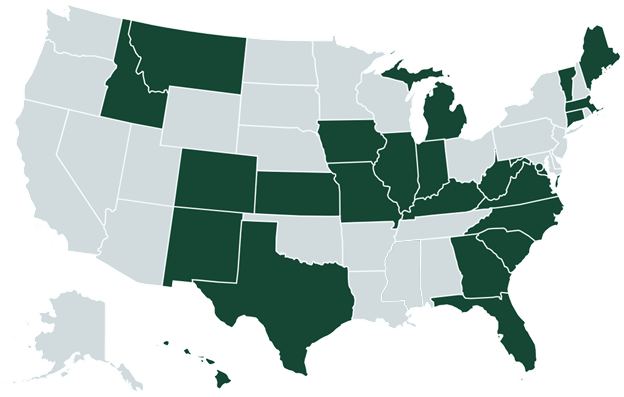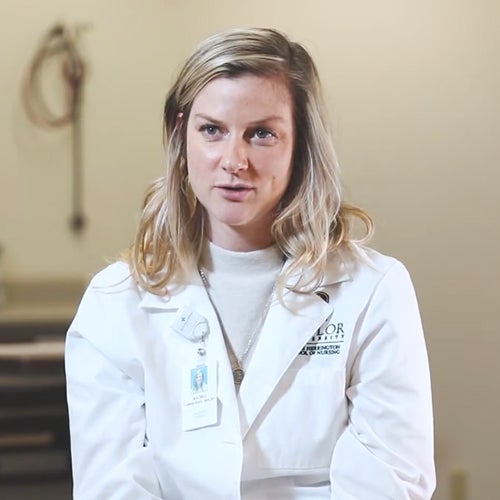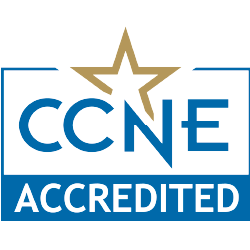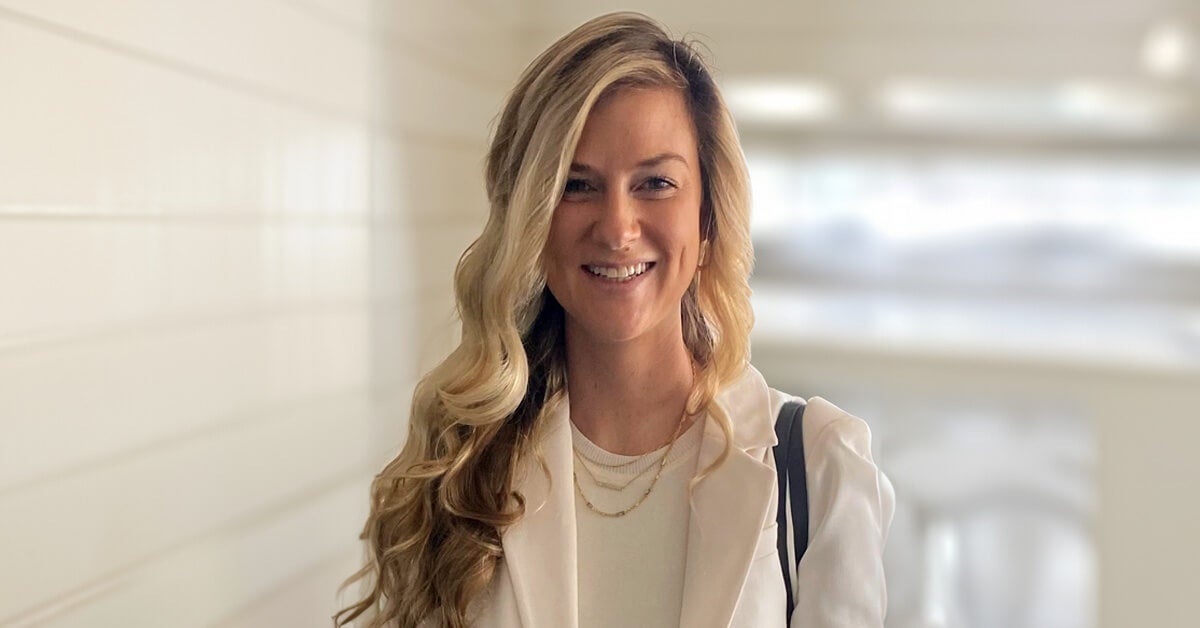- Online Coursework
- Placement Support
- CCNE Accredited
Provide Complex Acute Care for Adults
The Doctor of Nursing Practice - Adult-Gerontology Acute Care Nurse Practitioner track (DNP - AGACNP) prepares actively practicing RNs to provide acute care for the entire adult spectrum.

Focus on the Acute, Chronic & Critical Care Needs of Adult Patients
Bridge gaps in patient care through Baylor’s online DNP - Adult-Gerontology Acute Care NP track. Students gain advanced knowledge and build on clinical competencies in acute care environments as they prepare to deliver timely care to diverse and vulnerable populations.
As an online DNP-AGACNP student, you’ll learn how to:
- Serve as an advocate for patients with complex acute, critical, and chronic illness, disability, or injury.
- Utilize evidence-based practice, clinical reasoning, and inter-professional collaboration.
- Integrate and apply knowledge of patient-centered care, focusing on the specialization of individuals aged 18 years and older.
- Work in multiple team-based environments such as the ICU, ER, trauma unit, hospital surgery, and long-term care facilities.
-
The requirements to apply for the online BSN-DNP AGACNP program are:
- BSN from a regionally accredited school of nursing
- 3.0 cumulative GPA
- Courses taken pass/fail will not be eligible for admission
- One (1) year of full-time experience as a practicing professional nurse by the first day of class
- Current unencumbered RN license
- Complete an acceptable written personal statement
- Three letters of recommendation, as follows: one must be from an immediate supervisor, one must be from a peer nurse, and one must be from an MSN, DNP, or PhD-prepared nurse
- No GRE or MAT Required
The requirements to apply for the online Post Master's DNP program are:
- Verification of an unencumbered license to practice as an APRN
- Master's degree with a major in nursing
- Cumulative graduate GPA of 3.0 or higher
- Three letters of recommendation as follows: One must be from an immediate supervisor, one must be from a peer nurse and one must be from an MSN, DNP, or PhD-prepared nurse
- Verification of total clinical hours obtained for the Master's degree
- Complete a written personal statement
- Current clinical practice within the last two years
- Successful completion of graduate-level statistics course with a grade of B or better (must be completed prior to matriculation into the program)
-
-
The requirements to apply for the online BSN-DNP AGACNP program are:
- BSN from a regionally accredited school of nursing
- 3.0 cumulative GPA
- Courses taken pass/fail will not be eligible for admission
- One (1) year of full-time experience as a practicing professional nurse by the first day of class
- Current unencumbered RN license
- Complete an acceptable written personal statement
- Three letters of recommendation, as follows: one must be from an immediate supervisor, one must be from a peer nurse, and one must be from an MSN, DNP, or PhD-prepared nurse
- No GRE or MAT Required
The requirements to apply for the online Post Master's DNP program are:
- Verification of an unencumbered license to practice as an APRN
- Master's degree with a major in nursing
- Cumulative graduate GPA of 3.0 or higher
- Three letters of recommendation as follows: One must be from an immediate supervisor, one must be from a peer nurse and one must be from an MSN, DNP, or PhD-prepared nurse
- Verification of total clinical hours obtained for the Master's degree
- Complete a written personal statement
- Current clinical practice within the last two years
- Successful completion of graduate-level statistics course with a grade of B or better (must be completed prior to matriculation into the program)
Clinical Placement Support
Clinical placement is a required educational component of Baylor’s online nursing programs. The hands-on learning, supervision and applying theory into practice prepare you for your future role in the field. Many students also find potential employment opportunities at their placement site upon graduation.
01
How Does This Benefit You?
At Baylor, we believe you are only as successful as your training—that’s why we collaborate with our students to identify and secure sites and preceptors for all clinical rotations. Our staff will sort through the logistics of clinical placement so you can focus more on coursework and building competencies as a nurse.
02
How Does the Clinical Placement Process Work?
As a newly enrolled student, you’ll partner with our clinical team to determine unique placement needs. We’ll collaborate with you to identify placement opportunities, including locating and securing a quality site and preceptor during your program. You’ll be responsible for several preparation tasks, including filling out forms, passing a drug screening, background check and proof of recommended vaccinations.
03
What is the Placement Experience Like?
During your placement experience, you’ll have access to faculty and resources to support you on and off-site, including mentorship and guidance for procedures, patient interactions and proficiencies. At the end of your rotation, you and your preceptor will review requirements and complete any surveys. You may receive new details for your next clinical experience if you have multiple rotations.
04
What Can I Expect from My Preceptor?
Your preceptor is your on-site role model and will help you develop as a nurse during your clinical rotation. They will focus on helping you bridge gaps between theory and practice, orientate you to the practice setting, help you plan clinical assignments, provide 1:1 supervision, give daily feedback and complete required paperwork on your behalf.
Do I Qualify?
See below for a list of states in which we accept applicants for the online DNP-AGACNP program:
- Colorado
- Connecticut
- District of Columbia
- Florida
- Georgia
- Hawaii
- Idaho
- Illinois
- Indiana
- Iowa
- Kansas
- Kentucky
- Maine
- Massachusetts
- Michigan
- Missouri
- Montana
- New Mexico
- North Carolina
- South Carolina
- Texas
- Vermont
- Virginia
- West Virginia
Get More Program Details
The online DNP-AGACNP program track focuses on the complex acute, chronic and critical care needs of adult patients through an advanced curriculum that includes advanced pharmacology, applied ethics for APN, translational science and health informatics. View sample courses:
This course includes the application of pathologic disease mechanisms and advanced pharmacotherapy to refine and integrate techniques of history taking, physical examination, and diagnostics. Development of differential diagnoses that are prioritized based on clinical assessment, critical thinking, and clinical reasoning to narrow down the appropriate final diagnosis for adult and gerontology populations.
The purpose of this course is to explore high quality healthcare of geriatric patients which requires special knowledge and skills including identifying the normal and abnormal changes of the aging body with an overview of psychological, sociological, and physiological processes related to aging with particular attention to environmental, circumstantial, and behavioral concerns including cognition, perception of health, performance status, falls, malnutrition, pharmacotherapy, substance abuse, elder neglect and abuse, and end of life issues. Indications for collaboration and communication with the interprofessional team is emphasized as well as exploring community resources and care of the informal caregiver.
This is the first course of three, and the purpose of this course is to prepare AGACNP students to assess, diagnose, and coordinate healthcare needs of adults and older adults to include health promotion, disease prevention, and disease management. Emphasis is on synthesizing theoretical, scientific, and evidence-based practice knowledge to manage selected common health problems in adult-gerontology patients in a variety of inpatient and outpatient settings. Indications for collaboration, consultation, and referral with the interprofessional team using patient-centered, evidence-based, high-quality, cost-effective care in a culturally diverse system are essential functions of the adult-gerontology acute care nurse practitioner’s role. The accompanying practicum provides students with an opportunity to utilize theoretical knowledge and clinical decision-making skills in the management of care of adult and geriatric patients experiencing common health problems.
The AACN Synergy Model is used as a framework for AGACNP practice focusing on patient-centered physical, social, psychological, and spiritual care across the health-vulnerability continuum. The AGACNP is responsible for knowing and understanding patient characteristics shared by nurses, patients, and systems to include resiliency, vulnerability, stability, complexity, resource availability, participation in care, participation in decision-making, and predictability to restore a patient to an optimum level of wellness as defined by the patient which includes end-of life care (AACN, 2015a). The AGACNP must have knowledge, skills, attitudes, and experience to meet the needs of patients and families and include competencies of concern for patients, nurses, and systems such as clinical judgement, advocacy and moral agency, caring practices, collaboration, systems thinking, response to diversity, clinical inquiry, innovator/evaluator, and facilitation of learning (AACN, 2015a).
This is the second course of three, and the purpose of this course is to explore evidence-based practice models for the management of selected chronic health problems and acute exacerbations of those complex, chronic health problems. Students will focus on assessment, diagnosis, and treatment of adult-gerontology patients synthesizing theoretical, scientific, and evidence-based practice knowledge to manage selected chronic health problems in adult-gerontology patients in the acute care setting and/or specialty clinic. Indications for collaboration, consultation, and referral with the interprofessional team using patient-centered, evidence-based practice, high-quality, cost-effective care in a culturally diverse system are essential functions of the adult-gerontology acute care nurse practitioner’s role to improve health outcomes. The accompanying practicum provides students with an opportunity to utilize theoretical knowledge and clinical decision-making skills in the management of care of adult-gerontology patients experiencing chronic health problems.
The AACN Synergy Model is used as a framework for AGACNP practice focusing on patient-centered physical, social, psychological, and spiritual care across the health-vulnerability continuum. The AGACNP is responsible for knowing and understanding patient characteristics shared by nurses, patients, and systems to include resiliency, vulnerability, stability, complexity, resource availability, participation in care, participation in decision-making, and predictability to restore a patient to an optimum level of wellness as defined by the patient which includes end-of life care (AACN, 2015a). The AGACNP must have knowledge, skills, attitudes, and experience to meet the needs of patients and families and include competencies of concern for patients, nurses, and systems such as clinical judgement, advocacy and moral agency, caring practices, collaboration, systems thinking, response to diversity, clinical inquiry, innovator/evaluator, and facilitation of learning (AACN, 2015a).
Testimonials
Baylor Nursing By The Numbers
Here are some of the most frequently asked questions regarding Baylor University's Online DNP-AGACNP program
Students typically complete the DNP program in the following timeframe. Please note that actual length to program completion will vary depending on the student's background and selected track.
- BSN holders typically complete our DNP program in three (3) years and four (4) months, skipping the Master’s degree program entirely
- MSN holders typically complete our DNP program in 18 to 24 months
The following practitioner degree disciplines may be eligible to transfer to the online DNP programs:
- Psychiatric Nurse Practitioner
- Acute Care Nurse Practitioner
- Adult-Gerontology Nurse Practitioner
- Certified Registered Nurse Anesthetist (CRNA)
- Women’s Health Nurse Practitioner
A Doctor of Nursing Practice is the optimal pathway for registered nurses who are seeking preparation at the highest level of nursing practice. As a terminal degree, a DNP degree is the highest level of education in the field and represents the most advanced nursing degree available. There is no further opportunity for educational advancement within this profession. Graduates of Baylor’s online DNP program are prepared as exemplary nursing leaders and visionary nurses who can actively shape and improve patient outcomes, policy, processes and the future of nursing.
DNPs earn a higher average salary than an MSN (on average) and have more overall options for career goals. Many DNP graduates enter into positions with more responsibility to care for both individual and population health needs as nursing team leads and other expanded roles. The career outlook for DNPs is anticipated to be very strong as the AACN is advocating to require a DNP for all APRN roles by the year 2025.
A variety of financial aid is available to online students. Find more information on our Tuition & Financial Aid page.
Unfortunately, the online DNP-Adult-Gerontology Acute Care Nurse Practitioner program is not currently available at the Post-Master’s level. Please check back again as this may change.
Baylor University's Louise Herrington School of Nursing understands the needs and challenges of busy RNs. Our online coursework allows you to balance your career with your other commitments.
DNP vs. MSN?
The DNP is a terminal degree that prepares nurses for leadership, given the constantly changing demands of the U.S. healthcare system. Currently, steps are being taken to transition the DNP degree as the standard for entry-level advanced practice registered nurses (APRNs). While the profession is not yet there, earning your DNP helps future-proof your career as a qualified nurse leader.
According to AANC, nurses desiring an APRN education with the choice between a doctoral or master's level preparation would find it far more cost-effective to spend additional time towards their DNP and be prepared for future practice.
"Job opportunities are far greater, and it provides you with the knowledge and expertise to have a seat at the board table," according to Angela Renee Stewart, DNP, APRN, ACNP-BC, AOCNP, TTS, Clinical Assistant Professor at Baylor University, Louise Herrington School of Nursing.
Online DNP-Adult-Gerontology Acute Care Nurse Practitioner Program Outcomes
Baylor University’s DNP-AGACNP graduates will become professional acute care nurse practitioners while leading quality improvement in the health of adults and older adults. Our students will learn to:
- Provide complex monitoring and development of multifaceted treatment plans
- Prevent future complications while improving the health of the patient
- Lead nursing departments in research and quality improvement roles, as educators, and as administrators
Our students will:
- Fulfill a critical demand for management of complex acute conditions in hospitals and critical care environments
- Make influential decisions in acute healthcare to improve patient outcomes
- Deliver safe, high-quality, cost-effective, patient-centered care ranging from disease prevention to acute, chronic and critical care management across multiple settings and systems
- Collaborate with the inter-professional team to improve patient outcomes
- Provide evidence-based practice healthcare to diverse and vulnerable populations
- Have the opportunity to work with more autonomy and make care decisions
- Care for the unique needs of older patients
**The baccalaureate degree program in nursing, master's degree program in nursing, and Doctor of Nursing Practice program at Baylor University are accredited by the Commission on Collegiate Nursing Education, 655 K Street, NW, Suite 750, Washington, DC 20001, 202-887-6791.
















